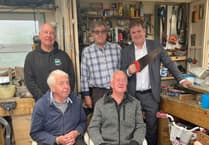RAIL travel is vital for our constituency, whether it’s getting to London, heading towards Cornwall, or connecting our towns and villages along the Tarka and Dartmoor lines.
When trains run well, they boost our economy, help our tourism industry thrive, and make life easier for commuters, students, and visitors alike. But when decisions about rail are driven by ideology rather than practical improvement, it is our communities that lose out.
That is why I campaigned for over a decade to successfully secure regular services between Okehampton and Exeter, and why I will continue to champion better local rail services.
The reopening of the Dartmoor Line has already been a huge success, with passenger numbers far exceeding expectations and new opportunities for local residents, businesses, and visitors.
The line has improved access to jobs, education, and tourism, while reducing pressure on the A30 and providing an alternative to the Dawlish line.
The next major step is the construction of the new Okehampton Interchange, which will be a true gateway for our region.
With integrated bus timetabling, it will improve regional connectivity across Devon and North Cornwall.
Key milestones are just around the corner: the lift installation will take place on September 8, followed by the pedestrian bridge on September 19.
Once complete, the interchange will make travel smoother and more convenient for everyone in the area, strengthening links between communities and boosting the local economy.
This year, Devon and Cornwall Rail Partnership and GWR have launched a fantastic initiative to celebrate 200 years of the modern railway: the Railway200 Stamp Trail.
With 33 stamps to collect at ticket offices, cafés and stations across the region - including Okehampton’s Bulleid Buffet and Crediton Station Tea Rooms. It’s a great way to explore, support local businesses and enjoy our heritage.
But better services are not guaranteed.
In 2015, GWR’s current fleet of Hitachi intercity trains, which serve our key route to London, was delivered thanks to £361 million of private investment.
Projects like this would face an uncertain future under Labour’s nationalisation plans, where every new train and infrastructure upgrade would have to compete for Treasury funding alongside public services like our NHS and Defence.
We have seen what happens when ideology drives decisions: in Scotland, since ScotRail was nationalised in 2022, 11 per cent fewer trains are running, punctuality has fallen, and costs to the taxpayer have risen by £70 million a year.
On South Western Railway, government interference in rolling stock leasing added £250 million to rollingstock rental costs without any improvement in service.
I’ve campaigned tirelessly for better rail in Devon - a railway focused on passengers, not politics.
That means continuing investment in modern trains, better intercity and regional services, and the infrastructure our towns and villages need to grow and thrive.
Nationalisation risks slowing that progress, just when we are beginning to see the benefits of years of hard work.
Mel Stride
MP for Central Devon





Comments
This article has no comments yet. Be the first to leave a comment.